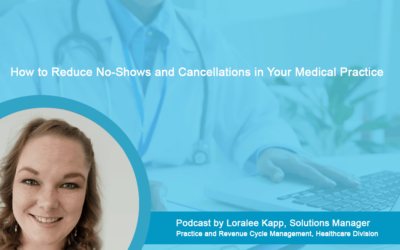Outsource Strategies International (OSI) is a U.S. based medical billing and coding company with years of experience in the industry. We provide reliable services for all healthcare specialties.
In today’s podcast, Natalie Tornese, one of our Senior Solutions Managers, discusses Allergic Rhinitis, its symptoms, treatments and codes.
In This Episode:
00:09 What is Allergic Rhinitis?
This condition refers to an allergic response to specific allergens. It is an inflammation inside the nose caused by allergens such as pollen, dust, or flakes of skin from certain animals.
01:23 Types of Allergic Rhinitis
Seasonal and perennial are two types of allergic rhinitis. While seasonal occurs at the same time every year, perennial is non-seasonal and occurs any time of the year.
02:23 Signs and symptoms
Symptoms for this condition may include sneezing, coughing, swollen eyes, runny nose, sore throat, frequent headaches, trouble smelling or more.
04:03 Treatment for Allergic Rhinitis
Treatments often combine medications and home remedies as well as other therapies such as immunotherapy or allergy shots and sublingual immunotherapy.
Read Transcript
Hello everyone and welcome to our podcast series. I wanted to talk a little bit about Allergic Rhinitis.
Allergic rhinitis – commonly known as hay fever – is an allergic response to specific allergens. An allergen is a harmless substance that causes an allergic reaction. The condition develops when the body’s immune system is sensitized and over reacts to something in the environment that typically causes no problems in most people. It refers to inflammation inside the nose caused by allergens such as pollen, dust, or flakes of skin from certain animals. About 8 percent of adults in the United States suffer from allergic rhinitis of some kind. It is estimated that between 10-30 percent of the worldwide population may also have allergic rhinitis. Allergy specialists or other physicians dealing with patients suffering from this condition must provide adequate treatment and also ensure that the medical coding for this specific disorder is properly done on the medical claims.
In most cases, when your body comes in contact with allergen, it happens to release histamine – a natural chemical that defends your body from the allergen. This chemical substance can cause allergic rhinitis and related symptoms. Common allergens include – tree pollen, grass pollen, dust mites, animal dander, cat saliva, mold, pet hair and other irritants such as cigarette smoke, perfume and diesel exhaust.
There are two types of allergic rhinitis – seasonal and perennial.
Seasonal, as the name suggests occurs at the same time every year. It is typically caused by an allergy to pollen or mold spores in the air. Pollen is the fine powder that comes from the stamen of flowering plants. It can be carried through the air and is easily inhaled. Perennial allergic rhinitis is non-seasonal and occurs any time of the year. The condition is caused by other allergens such as dust mites, pet hair or dander, or mold and symptoms can occur year-round.
Allergies can affect anyone, but a person is more likely to develop allergic rhinitis if there is a history of allergies in his/her family. Having asthma or a topic eczema can increase their risk of suffering from this condition. Other potential risk factors include –smoke, wind, perfume/hair spray, cigarette smoke, fumes, colognes, cold temperatures.
Symptoms can vary, but they can include –
- Sneezing and coughing
- Watery, red eyes
- Swollen eyes
- Trouble smelling
- Sore throat
- Runny nose
- Pressure in the nose and the cheeks
- Itching in the eyes, the nose, the mouth
- Hives
- Frequent headaches
- Ear fullness and popping and
- Dark circles under your eyes
Patients in most cases experience one or more of these symptoms immediately after coming in contact with the allergen. But, certain symptoms like recurrent headaches and fatigue may only happen after long-term exposure. It is important to consult an allergy specialist if the symptoms last for more than a few weeks and don’t improve.
For patients who happen to experience minor allergies, diagnosis may begin with a physical exam. The physician will ask questions about the immediate symptoms and evaluate previous medical history. Keeping a record of the symptoms over a period of time can help the doctor determine what triggers the allergies.
Sometimes a skin prick test is one of the most common tests actually that is done for the diagnosis. The physician will place several substances onto the patient skin to analyze how the body reacts to each one of them. Physicians will observe and record the way the patient’s skin reacts and in most cases, a small red bump may appear in cases where the person is allergic to the substance.
In addition, blood test and the RAST test may also be advised. The RAST measures the amount of immunoglobulin E antibodies to particular allergens in the blood and determine which specific substance a person is allergic to. Once the nature of the allergen is identified, physicians can decide on the future treatment options.
Treatments usually can involve a combination of medications and home remedies such as antihistamines, Decongestants, Eye drops and nasal sprays. Other therapies can include – immunotherapy or allergy shots and sublingual immunotherapy. Following certain home remedies can also prevent the allergy and this again will directly depend on the type of allergen. Using a dehumidifier or a HEPA filter can help control allergies while indoors.
I will include a transcript along with this podcast, outlining the specific CPT and ICD 10 codes related to this condition.
The outcome of the treatment depends largely on the severity of the condition. In most cases, seasonal allergies usually aren’t severe and can be well managed with medications. But, severe forms of this condition do require long-term treatment. One of the best ways to prevent allergy symptoms is to manage the allergies before one’s body has a chance to respond to the substances adversely. Other home tips to manage allergies include – keeping the windows and doors shut as frequently as possible during the allergy season, covering the mouth and nose while performing yard work, staying indoors when pollen counts are high, avoiding exercise outdoors early in the morning and taking a shower immediately after being outside.
I hope this helps, but always remember that documentation and a thorough knowledge of payer regulations and guidelines is critical to ensure accurate reimbursement for the procedures performed.



